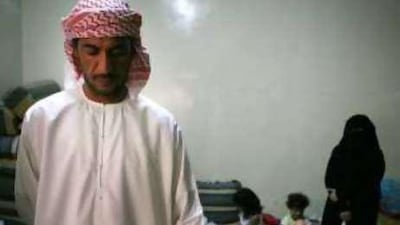AL SILA // Mariam Juma, an Emirati citizen, says she lives in fear of being thrown out of her home because her husband is one of the stateless. The couple, who live in Al Sila, in the far west of Abu Dhabi, married in 1995 but Mrs Juma's husband Ibrahim, originally from Iran, has not been able to resolve his status. His lack of paperwork, they say, means he has been unable to get regular employment to support his four children, with a fifth on the way. A house, too, is beyond them. For their entire married life the Jumas have been renting two rooms. Now, they say, they face eviction because their building is being reclaimed for the use of Emirati citizens. Mrs Juma says if her husband were to be granted citizenship it would change everything. His application is to be considered on Nov 12. "I am living in fear of the day we are evicted," she says. "Where else do they expect us to live? We have been married for more than 10 years and he is still being treated as a bidoon. We want to feel settled with our children; we need to feel secure." If he gets citizenship, says Mr Juma, "everything will open up in front of me for myself and my children. I will have job security and a decent place to live." Mr Juma works as a security guard, although the work is infrequent and poorly paid. He has been unable to renew his driving licence since it expired a year ago - another result, he says, of his stateless status. The family cannot even consider moving closer to Abu Dhabi in search of work and a better home; in their current economic state, they simply could not afford the rent. "We just want to feel secure in our home and have a sense of belonging," says Mrs Juma. Mr Juma's brother-in-law, Abdullah, lives nearby with his wife and three children in a single room in his father-in-law's rundown home. The young family say they have repeatedly visited the municipality to try to improve their situation but have been told that as they are stateless the state owes them nothing. "We came here as Arabs from Iran because the Emirates had a good reputation and we wanted to be with our Arab brothers," says Mohammed Ali, 55, Mr Juma's uncle and Abdullah's father-in-law. To make a living, he washes dead people before burial in Al Sila's cemetery. His six girls and two boys still live with him and his wife and, although his eldest son is 27 years old and holds a high-school degree, he can find no work. Mr Ali came to the Emirates in 1985 with his mother, Mariam Omran Issa, who shares the small, crowded home. She is the only one of the family who can boast Emirati citizenship. "It's just luck that I got it and they didn't," she says. Despite the problems, Mrs Issa does not regret her decision to come to the Emirates to create a new life. "Back in the islands where we lived, life was hard," she says. "We were very poor and there was no food or work. We wanted a better life." Whatever happens, the UAE is now her home: "If you have lived somewhere for 22 years and never left, it is your country. What other country would you say is our country?" kattwood@thenational.ae hkalaf@thenational.ae

Citizenship is path to opportunity and stability
Mariam Juma, an Emirati citizen, says she lives in fear of being thrown out of her home because her husband is one of the stateless.
Most popular today
